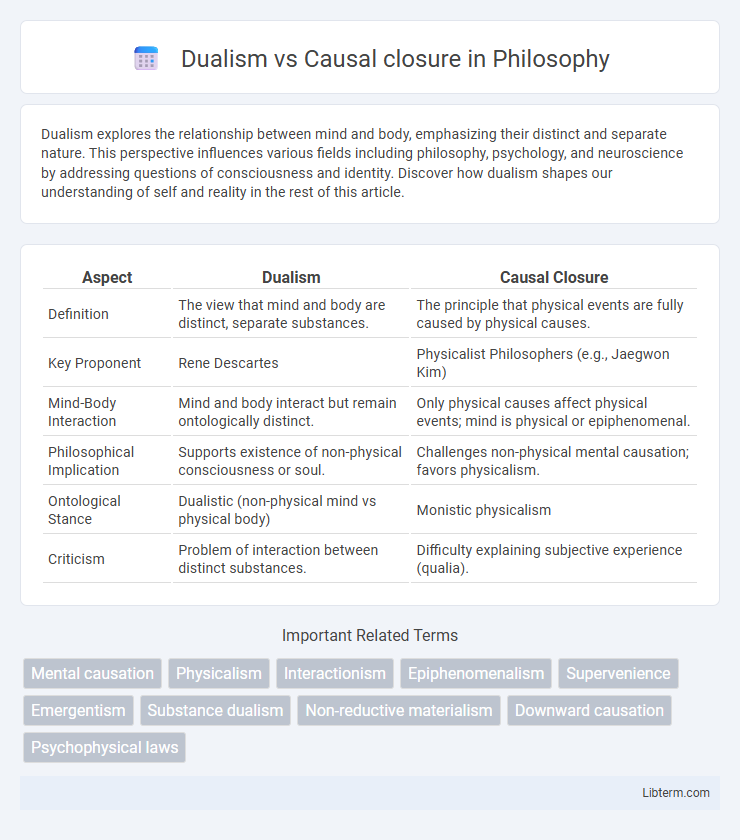Dualism explores the relationship between mind and body, emphasizing their distinct and separate nature. This perspective influences various fields including philosophy, psychology, and neuroscience by addressing questions of consciousness and identity. Discover how dualism shapes our understanding of self and reality in the rest of this article.
Table of Comparison
| Aspect | Dualism | Causal Closure |
|---|---|---|
| Definition | The view that mind and body are distinct, separate substances. | The principle that physical events are fully caused by physical causes. |
| Key Proponent | Rene Descartes | Physicalist Philosophers (e.g., Jaegwon Kim) |
| Mind-Body Interaction | Mind and body interact but remain ontologically distinct. | Only physical causes affect physical events; mind is physical or epiphenomenal. |
| Philosophical Implication | Supports existence of non-physical consciousness or soul. | Challenges non-physical mental causation; favors physicalism. |
| Ontological Stance | Dualistic (non-physical mind vs physical body) | Monistic physicalism |
| Criticism | Problem of interaction between distinct substances. | Difficulty explaining subjective experience (qualia). |
Introduction to Dualism and Causal Closure
Dualism posits the existence of two distinct substances or realms: the mental and the physical, suggesting that consciousness cannot be fully explained by physical processes alone. Causal closure of the physical world argues that every physical event has a sufficient physical cause, implying that mental phenomena must be reducible to physical interactions. This core tension challenges the compatibility between Dualism's non-physical mind and the principle of causal closure in physicalism.
Historical Background of Dualism
Dualism, rooted in Cartesian philosophy from the 17th century, asserts the existence of two distinct substances: mind and body, fundamentally different in nature. Historically, Rene Descartes pioneered this concept, arguing that mental phenomena are non-physical and cannot be reduced to physical processes. This contrasts with later developments in the philosophy of mind that question dualism's compatibility with the principle of causal closure in the physical world.
The Principle of Causal Closure Explained
The Principle of Causal Closure asserts that every physical event has a sufficient physical cause within the physical domain, implying that physical causes entirely account for physical effects. Dualism, which posits the existence of both physical and non-physical substances or realms, challenges this principle by suggesting that mental events can cause physical events without a purely physical cause. This tension highlights a fundamental debate in philosophy of mind regarding whether mental phenomena can exert causal influence independent of physical processes.
Mind-Body Problem: Dualism’s Perspective
Dualism asserts that the mind and body are distinct substances, with the mind being non-physical and not reducible to neural processes. This perspective challenges the principle of causal closure, which claims that physical events can only be caused by other physical events, by positing that mental states exert causal influence on the physical brain. Dualism addresses the mind-body problem by maintaining that mental phenomena cannot be fully explained by physical science alone, emphasizing the ontological gap between mental and physical realms.
Physicalism and the Rise of Causal Closure
Physicalism asserts that all phenomena, including consciousness, can be fully explained by physical processes, challenging dualism's division between mind and body. The rise of causal closure in physicalism posits that every physical event has a physical cause, leaving no causal gap for non-physical entities like the mind to influence physical states. This principle undermines dualism by asserting a closed causal chain in the physical realm, reinforcing a monistic view that excludes non-physical causes.
Key Arguments Supporting Dualism
Dualism asserts that mental phenomena cannot be fully explained by physical processes, emphasizing the irreducibility of consciousness and subjective experience. Key arguments include the knowledge argument, which highlights that physical explanations omit qualia, and the interaction problem, where mental states exert causal influence despite physical closure. These points challenge the principle of causal closure, which claims that physical events have only physical causes, thus supporting the dualist perspective that mind and body are fundamentally distinct.
Challenges to Causal Closure in Philosophy
Challenges to causal closure in philosophy arise primarily from arguments emphasizing the persistence of mental causation, which dualism claims cannot be fully explained by physical processes alone. Phenomena such as consciousness, intentionality, and subjective experience pose difficulties for strict physicalist accounts that rely on causal closure, suggesting gaps in the explanatory power of physical causation. These challenges fuel ongoing debates about whether the physical universe is causally closed or if non-physical substances or properties play a role in influencing physical states.
Interactionism: Bridging Dualism and Causal Closure
Interactionism posits that mind and body, though distinct as proposed by dualism, engage in causal exchange, challenging the strict causal closure of the physical domain. This perspective asserts that mental states can influence physical events without violating the laws governing physical processes, suggesting a bidirectional flow of causality. By integrating mental causation within a framework that respects physical causal closure, interactionism offers a nuanced approach that seeks to reconcile the ontological divide between mind and matter.
Implications for Science, Consciousness, and Free Will
Dualism posits that mind and matter are distinct substances, challenging the scientific principle of causal closure, which holds that physical events have only physical causes. This tension raises significant implications for the study of consciousness, suggesting that subjective experiences may not be fully explained by physical processes alone. The debate also influences perspectives on free will, with dualism supporting the notion of non-physical agency, while causal closure implies determinism governed by physical laws.
Conclusion: Future Directions in the Dualism vs Causal Closure Debate
Future directions in the dualism versus causal closure debate emphasize integrating neuroscience advancements with philosophical inquiry to reassess mental causation and physicalism. Researchers are exploring hybrid models that reconcile conscious experience with physical processes, potentially bridging gaps between dualist and physicalist positions. Interdisciplinary approaches incorporating quantum mechanics, cognitive science, and computational modeling aim to refine understanding of mind-body interactions within a causally closed physical framework.
Dualism Infographic

 libterm.com
libterm.com